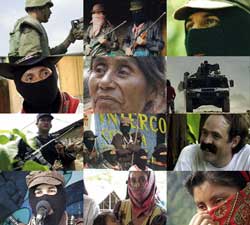8 January 2004 Edition
Zapatistas call on Indigenous people to organise

The first of January 2004 marked the tenth anniversary of the rising of the Zapatista Army of National Liberation (EZLN) in Chiapas in Southern Mexico. In the last days of December, the EZLN called on the Indigenous people to take their future into their own hands.
It was Commander David, one of the indigenous leaders of the EZLN, who made public the statement of the Zapatista army as the anniversary of its rising against the policies of the Mexican Government of the day approached.
There is a feeling among Zapatistas that the situation has not improved in the last ten years, but that "it is getting worse".
"Clearly, none of the Mexican Governments will give us the right and freedom to live with dignity, so we have stopped asking or demanding; it is now time to act and to exercise our rights as legitimate peoples and as the native population of our country," said the Zapatista leader. Commander David headed the EZLN delegation to the San Andrés negotiations in 1995 and 1996, which concluded with the San Andrés Accords, largely ignored by each Mexican administration since.
"The Zapatistas rose for a just cause, because the life and situation of the Indian people was getting worse. Indigenous people throughout our country suffer hunger, misery and humiliation," he said.
"First, they take away our natural resources, and then they exploit, mistreat and enslave us in our own land. For many years, the Indigenous people have suffered all kinds of injustice; we have been deprived of our right to the land, health care, education, food security, appropriate housing and our languages and cultures have not been respected. As a result, many Indigenous people have been fighting to reclaim their rights and to obtain justice. However, their demands have not been listened to by those who hold the reins of power and the wealth in this country."
One of the most positive aspects of the Zapatista uprising in Mexico is that it has placed Indigenous issues on the national agenda. The widespread support for the Zapatista demands by other Indigenous peoples and alternative movements in Mexico has placed Indigenous people on the agenda for governments, as unavoidable players when it comes to taking political, economic, social and cultural decisions in Mexico.
However, as Commander David pointed out, repression is still the response to Zapatista demands. "The peoples who fight for their rights suffer prosecution, imprisonment, the murder of their leaders, repression and massacres," he said. "Others are bought with left-overs and promises. All this history of pain and suffering is the reason why we had to take arms on 1 January 1994 to say enough of living and dying in humiliation and obscurity! Our fight as Zapatistas is for freedom and the rights of all indigenous peoples who should live with rights, freedom and justice."
The failure of successive Mexican governments to honour their commitment to Indigenous peoples has caused the Zapatista leadership's call on Indigenous people to organise and unite. "Every village, every state, every community should meet to talk about what they think, to analyse what should be done to change this sad situation," said Commander David. "This is the time and we should not wait for a bad government to give us its permission, because that would never happen. If we, the peoples, do not do it, no one will do it for us. Indigenous brothers and sisters, this is what I want to tell you: there is not other way to solve the situation that we, all the Indigenous peoples, are suffering."
